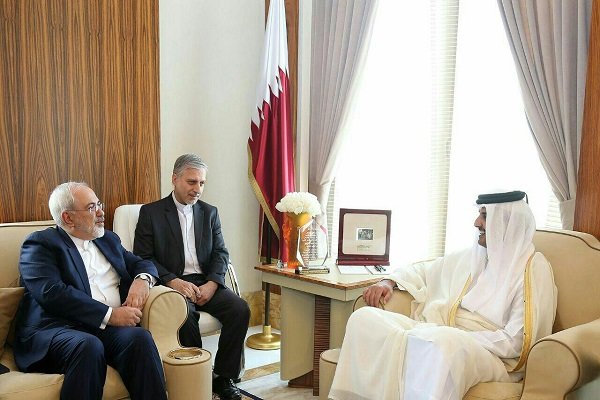Zarif in Qatar amid frosty Arab ties

TEHRAN – Iran’s Foreign Minister Mohammad Javad Zarif paid a formal visit to Doha on Wednesday, the third Arab country Tehran is consulting with within a month to mend fences with the Arab world.
Zarif held talks with the country's Emir Sheikh Tamim Bin Hamad Al-Thani on ways to improve ties as Doha has yet to reinstate its ambassador to Iran.
The top Iranian diplomat also met his Qatari counterpart during the trip, his second this year.
An Iranian diplomat in Doha, who declined to be named, said Zarif discussed on Wednesday with Qatar's Emir Sheikh Tamim Bin Hamad Al-Thani ways to establish "better ties" between the two countries.
The visit comes weeks after a one-day visit to Oman and Kuwait by President Hassan Rouhani, itself a response to a rare visit to Tehran in two years by Kuwaiti Foreign Minister Sheikh Sabah Khaled al-Sabah to deliver a message to Rouhani on a “basis of dialogue” between Arab states and Iran.
Less tension between Iran and Arab states will make inroads into the beleaguered Middle East.
Efforts to settle conflicts in Syria and Yemen have failed so far. One main cause, according to people familiar with the issue, is the political standoff between Tehran and Riyadh over a list of issues, with no let-up in war of words between the two.
In a recent interview with the Iranian ISNA news agency, Zarif said Tehran was not receiving positive signals from Saudi Arabia although he was hopeful the Saudis could take lessons from their previous misdoings in the region.
While Iran is seeking a reconciliation, Saudi Arabia continues with its vehement discourse about Iran.
During the recent Munich Security Conference in Germany, Saudi Foreign Minister Adel al-Jubeir demanded that Iran be “punished,” claiming Tehran is funding separatists in Yemen, what Tehran strongly rejects.
Riyadh and some other Arab countries claim that Iran interferes in their affairs by fueling sectarianism to expand its sphere of influence in the sensitive region. Tehran denies any interference in the region, saying it is the Salafi ideology promoted by Saudi Arabia that is the root cause of extremism and sectarianism in the region and beyond.
Tensions between Saudi Arabia and Iran have particularly reached levels unseen since the 1980s, when most Arab countries sided with Iraq after it waged a war against Iran, which lasted for nearly eight years.
Tehran and Saudi Arabia do not agree on the situation in Syria. Backing President Bashar al-Assad unfailingly, Iran opposes demands by Saudi Arabia and other Arab states that Assad should step down.
Prior to the recent Astana talks on the Syrian conflict, Iranian Defense Minister Hossein Dehqan said that Riyadh should be barred from taking part in the negotiations because of its stance on a Syria without al-Assad.
On Saturday, Iran’s parliamentary National Security and Foreign Policy Committee declared that it was going to review Tehran’s policies toward Saudi Arabia.
As archrivals, Tehran and Riyadh have had no political relations for a little more than a year after Riyadh summoned its diplomats from Tehran in the aftermath of attacks on its diplomatic missions in Iran by angry mobs.
The storming came after Riyadh's execution of Sheikh Nimr al-Nimr, an outspoken opponent of the Saudi kingdom.
On Jan. 17, Iranian President Hassan Rouhani said at least 10 countries had offered mediation to lessen the escalating feud.
AK/PA
Leave a Comment